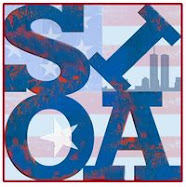Just received this E-Blast from Laura a few minutes ago and thought enough of it to rush it to print (so to speak). In it she asks some very poignant questions we should all be asking our legislators before they spend nearly a trillion of our and our children's tax dollars for something they HOPE will repair the current financial catastrophe. Here they are:
1) Since the White House introduced the bailout last week, a number of alternative ideas have been proposed. For one, Michigan Republican Thaddeus McCotter wrote a 10-point plan that carries no cost to taxpayers. Others, like George Soros', are significantly less expensive and, in his estimation, likelier to be effective. Can you explain why this bill is the best option, despite being the most expensive?
2) We're told the bailout could actually turn a profit for taxpayers. Assuming that's true, how can we be sure the money actually ends up back in taxpayers' hands? For years the Social Security system took in more money than it paid out, yet instead of putting the surplus revenue toward future benefits, Congress snatched that extra cash for general expenditures. Likewise, Fannie and Freddie's "profits," were used for congressional pet projects. With this track record, how can we trust that this program will be any different?
3) The McCain campaign yesterday pointed out that the most recent housing bill gave the government nearly $1 trillion to purchase mortgages. If this is true, why exactly does Congress need to pass this monstrous legislation?
4) Does the latest version of this bill still "allow the government to purchase troubled assets from pension plans, local governments, and small banks that serve low- and middle-income families"? Americans are having a hard enough time swallowing the idea of a bailout for irresponsible home, car, and student lending. The notion that we'll be on the hook for insolvent pension plans administered by awful, union-controlled lawmakers in cities like Detroit and New York is simply insane.
5) Does the bill's preamble still proclaim that the law "provides authority to the treasury secretary to ... ensure the economic well-being of Americans?" Does anyone know if there are limitations to this seemingly unbridled authority? Otherwise, what prevents the Treasury secretary from becoming a de-facto dictator? This strikes me as especially worth discussion.
6) Are there still no meaningful curtailments of Fannie Mae and Freddie Mac? Does the bill contain anything even hinting at accountability?
7) What concrete assurances do taxpayers have that the turmoil's provenance - Carter and Clinton-era social-engineering dictums that upended safe-lending practices in favor of higher minority home ownership - will forever be outlawed? How do we know taxpayers won't be asked to finance another $700 billion bailout in 10 years? What has Congress learned from its past mistakes?
8) After Enron's collapse, former CEO Jeffrey Skilling, then-CEO Ken Lay, and then-CFO Andrew Fastow, were called to testify before Congress. According to the Business and Media Institute, Fannie's and Freddie's overstated earnings were 19 times larger than Enron's fake numbers. So when can we expect Congress to call Jim Johnson, Franklin Raines, Barney Frank, Chris Dodd, and the rest of Fannie's and Freddie's enablers to testify before Congress?
1) Since the White House introduced the bailout last week, a number of alternative ideas have been proposed. For one, Michigan Republican Thaddeus McCotter wrote a 10-point plan that carries no cost to taxpayers. Others, like George Soros', are significantly less expensive and, in his estimation, likelier to be effective. Can you explain why this bill is the best option, despite being the most expensive?
2) We're told the bailout could actually turn a profit for taxpayers. Assuming that's true, how can we be sure the money actually ends up back in taxpayers' hands? For years the Social Security system took in more money than it paid out, yet instead of putting the surplus revenue toward future benefits, Congress snatched that extra cash for general expenditures. Likewise, Fannie and Freddie's "profits," were used for congressional pet projects. With this track record, how can we trust that this program will be any different?
3) The McCain campaign yesterday pointed out that the most recent housing bill gave the government nearly $1 trillion to purchase mortgages. If this is true, why exactly does Congress need to pass this monstrous legislation?
4) Does the latest version of this bill still "allow the government to purchase troubled assets from pension plans, local governments, and small banks that serve low- and middle-income families"? Americans are having a hard enough time swallowing the idea of a bailout for irresponsible home, car, and student lending. The notion that we'll be on the hook for insolvent pension plans administered by awful, union-controlled lawmakers in cities like Detroit and New York is simply insane.
5) Does the bill's preamble still proclaim that the law "provides authority to the treasury secretary to ... ensure the economic well-being of Americans?" Does anyone know if there are limitations to this seemingly unbridled authority? Otherwise, what prevents the Treasury secretary from becoming a de-facto dictator? This strikes me as especially worth discussion.
6) Are there still no meaningful curtailments of Fannie Mae and Freddie Mac? Does the bill contain anything even hinting at accountability?
7) What concrete assurances do taxpayers have that the turmoil's provenance - Carter and Clinton-era social-engineering dictums that upended safe-lending practices in favor of higher minority home ownership - will forever be outlawed? How do we know taxpayers won't be asked to finance another $700 billion bailout in 10 years? What has Congress learned from its past mistakes?
8) After Enron's collapse, former CEO Jeffrey Skilling, then-CEO Ken Lay, and then-CFO Andrew Fastow, were called to testify before Congress. According to the Business and Media Institute, Fannie's and Freddie's overstated earnings were 19 times larger than Enron's fake numbers. So when can we expect Congress to call Jim Johnson, Franklin Raines, Barney Frank, Chris Dodd, and the rest of Fannie's and Freddie's enablers to testify before Congress?













0 comments:
Post a Comment